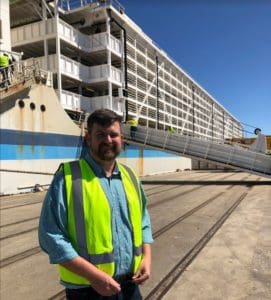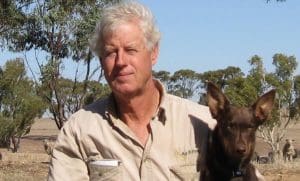
Australian Livestock Exporters’ Council CEO Mark Harvey-Sutton dockside.
LIVE sheep export supporters have sought the support of the Western Australian Government and federal crossbench senators as a panel this week started consultation on the trade’s national phase-out.
The live export industry remains adamant it will not consult with the independent panel on the terms of a phase-out and this was reinforced by a letter signed by 28 industry players sent this week to WA Premier Mark McGowan and Agriculture Minister Jackie Jarvis.
Australian Livestock Exporters Council chief executive officer Mark Harvey-Sutton said the letter from producer groups and industry companies asked the WA Premier and Ms Jarvis to stand up for WA producers and actively oppose the phase-out policy with Prime Minister Anthony Albanese and Minister for Agriculture Murray Watt.
“Having 28 groups from right across WA and across other industries other industries demonstrates the concern present in the WA ag sector and the devastating impact the policy would have,” Mr Harvey-Sutton said.
“The fact the panel is in the west this week has made the plea for help to the Premier all the more pertinent.
“The groups that signed this letter and the letter to Minister Watt have all made very clear they’re not interested in discussing a transition away from the trade because the policy is wrong,” he said.
PGA president Seabrook meets with Senate crossbenchers

PGA president Tony Seabrook.
Pastoralists and Graziers’ Association of WA president Tony Seabrook met with Senators Raff Ciccone, Slade Brockman, Jacqui Lambie, Pauline Hanson, David Pocock and the Minister for Resources and Northern Australia, Madeline King’s senior staff in Canberra last week.
Mr Seabrook said the core reason for engaging with the federal independents was that if voting on any phase-out legislation was tight, they would be important to stop it proceeding.
“We’re not going to give up,” Mr Seabrook said.
“It was very clear from my meetings that there is not a great deal of support amongst the Senate crossbench for Labor’s decision to ban the live sheep trade.
“There are also divided opinions within members of the ALP over their election commitment to phase out the live sheep trade,” he said.
The Federal Government has promised not to end the trade in this current term, and Mr Seabrook said he discussed with the Labor members how they could drop the phase-out policy from the AKP platform.
“That’s probably the best avenue we’ve got, because if they take it to the next election, then it will be really hard as we try to sway every single independent in the Senate to block it.”
“There are a lot more pragmatic members in the Labor party than you might think.”
He said a change in government at the federal level would be “nirvana”, but he doubted that was a realistic perspective.
Mr Seabrook said senators Slade Brockman, Jacqui Lambie and Pauline Hanson were fully supportive of live sheep exports, and recognised the importance of the trade to regional producers, regional families, and regional communities.
“They were also acutely aware that once live sheep exports are banned, the next target will be the live cattle trade.
‘Senator Pocock was also very receptive and willing to accept an invite to come over to WA and meet with sheep producers who will be negatively impacted by the Albanese Government’s disastrous decision to end this vital, humane, and legal trade,” Mr Seabrook said.
‘Assassination squad’ meeting on Thursday
Mr Seabrook said PGA would meeting the “assassination squad” (independent panel) on Thursday afternoon, but only to avoid being labelled as unwilling to engage.
“We are going to go along and we are going to say ‘We are only here for one reason: to advise the minister that after due consideration it is not possible to shut the trade’.
“That’s it, end of story, finished, final; we are not prepared to discuss any issues around what you see as being the way you are going to wind it up, we’re not even going to go there,” he said.
Mr Seabrook said the panel is meeting with each body separately – “the old divide and conquer” – and all groups would be saying the same thing:
“Do not allow yourself to be dragged into this, because the minute they’ve got even the slightest agreement from you, they will exploit that.”
A Department of Agriculture, Fisheries and Forestry spokesperson said the panel is in Perth this week meeting with a range of stakeholders, including Western Australian state government representatives, live sheep exporters, peak industry bodies, supply chain participants, animal welfare organisations and other relevant experts.
The panel will return to Western Australia in future weeks for further consultation with stakeholders in regional areas, spokesperson said. Stakeholders can also contribute their views through the department’s have your say site https://haveyoursay.agriculture.gov.au/live-sheep-phase-out.
Mr Seabrook said contrary to the comments made by Agriculture Minister Murray Watt, “this is a trade that is not dying and one that cannot simply be replaced with onshore processing.”
“The only decline that the trade has suffered over the past three years comes not from a lack of demand from our overseas customers, but from high livestock prices, limited supply, and reduced shipping timeframes due to the current moratorium on exports during the northern hemisphere summer months.
“In Western Australia, the live export industry is a major buyer of our livestock, supports regional businesses, and provides much needed regional jobs, which in turn strengthens our regional communities,” he said.
“Phasing out live sheep exports will only serve to destroy regional jobs, regional communities, regional businesses, and hard working Western Australian regional families.”
In another extension of the campaign to retain the trade, live export lobby group Livestock Collective released a video on Linkedin portraying the stages in shipping sheep live to Middle Eastern markets.

Is it the “trained professionals” at the pre-export quarantine facility, or the veterinarians individually inspecting all sheep at the port, who are allowing late-stage pregnant ewes, sheep with shearing injuries and dog bite injuries, and sheep with non-compliant-length fleece to be loaded?
The comment “we abide by ASEL regulated by the Australian government at all stages of the supply chain in Australia” is patently false, but what else would we expect from the Livestock Collective?
Claiming that all sheep also always have access to feed and water is also false; at least six voyages out of the 2018-2020 sheep voyages included mention by Independent Observers (IOs) of withholding feed and water, and another 12 having poor quality or insufficient feed or dirty water.
In total, 75 percent of those 42 voyages with sheep and IOs aboard during that 2018-2020 period were not ASEL-compliant.